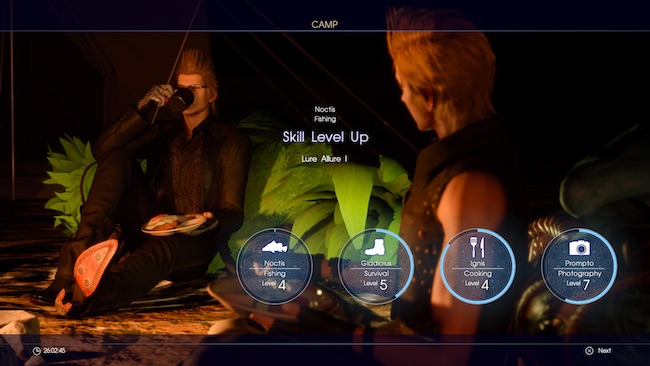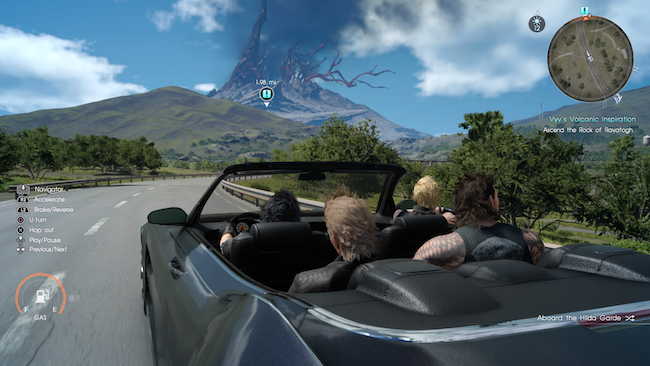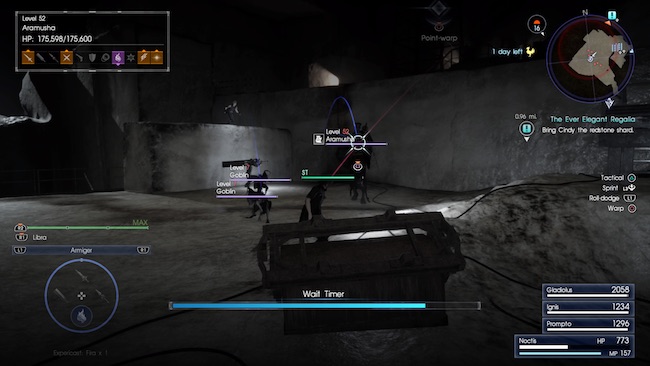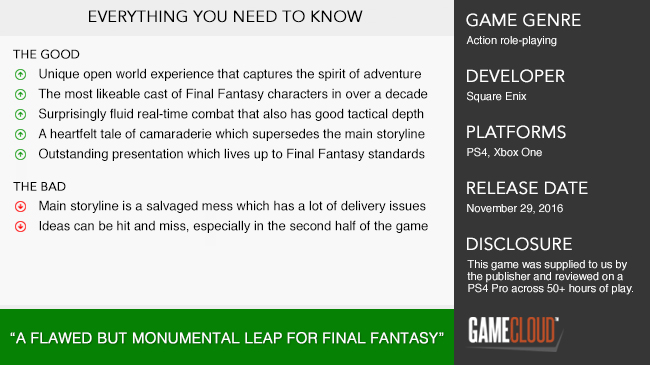
If there’s one thing you can count on when a new mainline instalment of Final Fantasy releases, it’s that the fanbase is going to be highly divided on it no matter what. For all its strengths and weaknesses, Final Fantasy XV is no exception. What is unique about this particular entry, however, is that it began its life in 2006 as an entirely different game. Final Fantasy Versus XIII was to be a “fantasy based on reality,” and was originally intended as a companion game to Final Fantasy XIII. It was helmed by Kingdom Hearts creator Tetsuya Nomura, and was romanticised for years because of its darker tone. The truth as we now know it, though, is the game never actually went into full production. After years of going nowhere, it was eventually re-revealed at E3 2013 as Final Fantasy XV; a game which at first tried to carry that original vision across, but slowly became its own thing as the core development shifted toward an open world design.
Final Fantasy XV opens with a distinct message: “A Final Fantasy for Fans and First-Timers.” It’s a bold claim for a game in an established series, but it’s also entirely accurate. The final product is not only a game that harkens back to the heart and soul of the original Final Fantasy, it’s very easy for someone totally uninitiated to pick up and play. I can only speculate as to how much of Versus XIII actually remains, but it’s clear from the get-go that this all-encompassing vision was driven by Hajime Tabata (director of FFVII: Crisis Core and FF: Type-0), who took the reigns from Nomura in 2014. Stepping away from years of radio silence and poor communication, Tabata brought the development of Final Fantasy XV into the public’s eye with regular “Active Time Reports,” playable demos, and a consistent effort to gather feedback from fans in order to make the game the best it could be. There is no denying this is a game made with love.

Final Fantasy XV begins with Prince Noctis of Lucis and his entourage of friends, Ignis, Gladiolus and Prompto setting out on a road trip to a country called Altissia, where Noctis is set to marry to Lady Lunafreya of Tenebrae. Assuming you’re fresh-eyed to the story, it’s about the least complicated introduction to a Final Fantasy game there has ever been. It works really well, too, as the player’s first moments in the game involve pushing a broken down car to a gas station while listening to Florence + the Machine’s cover of “Stand By Me.” Everything about the opening hours has a real feel-good vibe to it, with the game almost immediately setting players loose to explore its massive open world. It’s a bold departure from where the series was headed, and exactly what Final Fantasy needed to regain some footing in the West. That’s not to say the game isn’t highly flawed, it is, but this only makes its successes even more impressive.
Despite trying to maintain a healthy amount of optimism going in, I had some serious doubts as to whether it was even possible for it to come together in the end. It was a monumental responsibility to pick up such a troubled project and make it work, especially with the pressure of declining relevancy and the need for it to be hugely successful. It’s actually staggering how much this game has improved since Episode Duscae, let alone more recent builds shown throughout the year, so I was genuinely surprised by how quickly I fell in love with its world. Open world games are a dime a dozen these days, and this makes it all the more refreshing to play something which feels wildly different to the status quo. Final Fantasy XV has a lot of unique systems and ideas, some of which work better than others, but as a whole, come together to deliver a heartfelt road trip adventure which resonates much louder than the sum of its parts.

The most prevalent issue with Final Fantasy XV is that the plot is a hot mess. It’s not that the story is bad, but rather the way it’s delivered feels weird and jarring. Cutscenes frequently seem out of place or just end abruptly, and there are some moments in the main quest where it feels like they’re missing altogether. It’s clear as day Tabata’s team had major issues trying to adapt the Versus XIII story, to a point where the original opening had to be converted into a film (Kingsglaive), and latter part of the main quest had to abandon the open world because the scale was likely too huge of an undertaking to do it any other way. It all feels terribly disjointed, and despite claims that the film and companion anime (Brotherhood) are not essential, I have to disagree. The tone is wildly different between each piece of media, but there is a lot of fundamental information about the world of Eos you’ll be missing out on if you don’t dive into that first.
What makes this game so special, though, is the underlining tale of male camaraderie that’s ever-present throughout the adventure. After years of boy band puns and thinly veiled homophobia, it will maybe come as a surprise just how likeable the main cast is. This in part comes down to a lot of great dialogue which organically unfolds as you play, but also in how each personality is integrated into the game’s core systems. Each day spent in the world of Eos feels lived in, with a day/night cycle that serves a purpose beyond making the game look pretty. At night, powerful daemons prowl the countryside, so you’re taught early on to rest up once it gets dark, before setting out again the following day. It all sounds a bit superfluous, but it’s this process which adds so much life to the game. Camping allows you to bank experience and cook food to apply buffs, but Promto’s photography may just be the most endearing part of the game.

Exploration is a huge part of Final Fantasy XV, with the game offering a generous selection of side quests and monster hunts to dig into. Admittedly, most of these quests are a typical JRPG affair, but they’re also a core part of generating income. Money isn’t commonplace this time around, so you shouldn’t expect to get showered with gil every time you kill something. All the same, I’d still like to see the Final Fantasy series take a step forward in this area narratively (like with many Western RPGs), but the simplicity of this tried and true formula still has its appeal. Eos is just a fun world to be in with its rich ecosystem, impressive landmarks, and a plethora of secrets to uncover. The optional dungeons, in particular, provide some of the best moments in the game. There’s actually a lot here which calls back to earlier Final Fantasy titles; not just because of the subtle layers of fan service, but how it genuinely captures the spirit of adventure.
Something I found interesting are the ways in which you can get around. Chocobos are the best they’ve ever been in the series. Not only do they control really well, you can conveniently call them onto the field at any time (as well as go race them for fun). They’re basically a perfect adventuring companion. Noctis’ car (the Regalia) on the other hand is more of a mixed bag, but something I grew to appreciate. Fast travel load times aren’t great, and you can’t drive it off-road so manual control feels a bit pointless. However, there’s something unusually cathartic about simply taking in the visual spectacle of a trip while Ignis is at the wheel, especially when you can sit back and get lost in the nostalgia of a soundtrack that spans the entire series. It could’ve done more, but I still feel it still served a vital role as the grounding point for the journey. Chocobos and the Regalia can also be customised to varying degrees, which I thought was fun.

While I don’t romanticise turn-based combat as being a vital component of a Final Fantasy game, I have to admit I had serious doubts whether the action-oriented direction of XV was going to work. I could see what they were aiming for, and I was open to the idea, but the demos left me with a slew of concerns. It’s for this reason I’m blown away by how far it’s come in such a short period of time. While the camera still has a few hiccups (mostly in tight spaces), the mechanics feel fluid and provide an incredibly fun toolset to experiment with. Warping around the environment simply feels great, and the way your teammates will engage with you in combat, either with link strikes or battle techniques, works well. I ‘m also extremely appreciative for the alternate control and camera options, as well as the inclusion of a “wait mode,” which is what ultimately won me over. XV’s battle system may actually be one of my favourites of all time.
Magic has also changed in a significant way to become a limited but more powerful resource. Basically, you draw magic from the environment (fire, lightning and ice) and use it to craft spells (which can also be further enhanced with treasures and items to add status effects). It’s an elegant but highly effective take on an established system, especially as the spells in XV utilise an area effect as opposed to something which can be spammed at enemies. Summons are also something of a spectacle. There are only several in the game, and their trigger conditions are obscure, but when the option shows up, hold L2, because you’re in for a treat. That said, not all of XV’s ideas work so well. Ring magic is awkward and disappointing (particularly when you’re forced to use it), and any attempts at stealth are just a complete waste of time. I’d also be remised not to point out that using the same button for jump and interact is annoying as hell.

Final Fantasy has long been renowned for its visual prowess, and this instalment is no exception. Admittedly, it has a few rough edges, but it’s clear a lot of hard work went into refining a lot of little details which make it feel unique – the animation is particularly outstanding. It’s all very impressive when you take into account the game’s ambition, and that it achieves this while managing a decent frame rate across all platforms (a big surprise considering how inconsistent it was before release). I was also pleasantly surprised by some set piece moments which take a cue from franchises like God of War and the Uncharted series. Mechanically, I think these sections are vastly inferior in terms of gameplay, but they had enough of an impact to leave a lasting impression. That’s what’s consistent here, though: Final Fantasy XV is a game with a vision so strong it’s easy to look beyond its flaws because of the hope that it instils for the series’ future.
When I think back on my time with Final Fantasy XV, it’s not the jarring story exposition or occasionally janky gameplay sequence which springs to mind. I’m thinking about what it’s like walking along a candle lit jetty in Galdin Quay at night or riding a Chocobo across the plains of Duscae while it’s raining. Character moments like when you catch a fish and Ignis proclaims he’s come up with a new recipe, so you all gather around a campfire that night to banter away and eat some of the best-looking food ever seen in a video game. There’s also the incredible soundtrack by Yoko Shimomura which so beautifully captures the essence of Noctis’ journey (“Somnus” is amazing!), as well as an English voice cast who manage to deliver a surprisingly convincing performance. If it’s not for you, however, that’s okay. For the first time in the series’ history, there’s also an option to swap to the original Japanese audio, which will make a lot of fans happy.

While Final Fantasy XV might feel like a radical departure for the series in some ways, it’s also the closest Square Enix has come in over a decade to recapturing what makes Final Fantasy so special. Make no mistake, this is a game with some significant flaws – many of which seem to stem from trying to salvage an inherently different game. However, what sets XV apart from other modern Final Fantasy games is its ambition and a relentless push to innovate. It’s clear Hajime Tabata has a vision for the series – one that’s driven by a love of Final Fantasy and respect for its fans. Whether you’re a fan or a first-timer, though, there’s a lot of fun to be had here. Eos is a wonderfully realised open world, filled with unique ideas, tons of content, and a combat system that’s surprisingly fluid. Noctis, Ignis, Gladiolus and Prompto are also just a straight up great cast of characters, whose heartfelt tale of camaraderie supersedes the main storyline to deliver an emotionally rewarding role-playing experience. I’m truly excited to see where the series can go from here.











